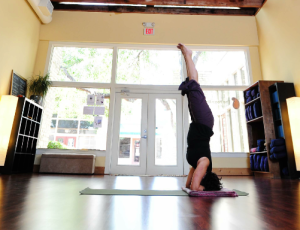Your Teacher is Going on Vacation. Don't Panic!
I know it can be really disappointing when your regular yoga teacher is absent from her class. Maybe she had a last minute emergency, or maybe it was a long-planned vacation. It’s important to acknowledge when this feeling comes up. The feeling is perfectly normal, and it's also a great opportunity for yogic inquiry and personal growth.
There are typically two ways that you end up with a sub teacher. Either you know in advance that your teacher is going to be away, or you walk into class expecting to see your teacher and are surprised to find another teacher at the front of the room.
If you know in advance that your favorite teacher is going to be away, you may be tempted to skip class, or you may decide to attend anyway but feel wary of the sub.
If you walk into class expecting to see your regular teacher and find someone else at the front of the room, you might feel a pang of stress or uncertainty, or you might even be tempted to turn around and walk out.
First, it’s important to recognize that it’s normal to feel unsettled when something is new, different, or unexpected.
Recognizing your situation is part of the yogic practice called svadhyaya, which means self-study in Sanskrit. Svadhyaya is one of my personal favorites because it provides unlimited potential for personal growth.
Once you recognize your situation, you can move forward to practice another yogic concept: equanimity.
Equanimity is practicing and learning to be comfortable and peaceful, even in unknown, uncertain, or uncomfortable situations.

On the yoga mat, for example, we practice equanimity when we try to remain peaceful in a pose doesn’t work for our body. We have options: we can modify the pose, we can take a break, or we can do a different pose. The real trick is to figure out how to be ok with doing some different than or even “less than” what is expected.
So then, in the example of when your regular yoga teacher is absent, how can you practice equanimity?
First, recognize that it can be challenging for both the students and the sub because each doesn’t know what to expect from the other.
Naturally, your substitute teacher's style will be different than that of your regular teacher. It’s a perfect opportunity to practice being peaceful and ok in an uncertain situation. Know that the teacher may use different language or may lead you into poses in a different way, but it doesn’t mean their teaching is better than or worse than, it’s just a different.
There is always something to learn from a new teacher, even if it's not what you were expecting to learn. The challenge is to be open to whatever it is the teacher offers.
Maybe you’ll learn how to get into a pose that was previously inaccessible to you, maybe you’ll learn a new variation or modification of one of your favorite poses, maybe you’ll learn a new subtlety about breathing, or maybe you’ll learn that there’s challenge and benefit in learning how to practice more slowly. The potential learnings are truly infinite.
So I encourage you, the next time your regular teacher has to miss a class, be open what you can learn from the sub. You might just learn something special that shifts your awareness or transforms your practice.
 XO,
Zelinda
XO,
Zelinda
If You're Going to be Selfish...
Have you ever heard the word Equanimity? I'd never heard of equanimity until I was training to become a yoga teacher. The word appears in many yogic texts, and it's provided some powerful lessons in my life. My definition of equanimity is "the ability to maintain one's peace in any situation." This definition brings to mind a quote I read in one translation of the Yoga Sutras: "If you're going to be selfish about something, be selfish about maintaining your peace."
 What exactly does this mean?
Equanimity means that whether you find yourself in a good or bad situation, you feel emotionally balanced and centered. You are aware of your emotions and temperament, and in any given situation you are neither excessively happy or sad, elated or angry. You just ARE.
What exactly does this mean?
Equanimity means that whether you find yourself in a good or bad situation, you feel emotionally balanced and centered. You are aware of your emotions and temperament, and in any given situation you are neither excessively happy or sad, elated or angry. You just ARE.
Why is it important to maintain your peace? Maintaining your peace has so many benefits. In a nutshell, it helps you conserve your energy and maintain your sanity.
Imagine you're going on vacation for a week. You arrive at the airport only to find your flight is delayed 3 hours. In this moment you have a choice. You can be angry, curse the ticket agent, and waste your time and energy on negative emotions. Or you can think to yourself, "Oh, a delay. How can I most enjoyably spend these 3 hours?" Maybe you go and find a great book at the bookstore, pick up a nice cup of coffee or tea, and find a cozy spot to sit and read and enjoy the luxury of time.
Imagine a different scenario. You're competing in a golf tournament and you score a hole in one. As your group begins to celebrate and congratulate you, you have two choices. You can get caught up in the excitement, maybe have a few too many celebratory beers, screw up your concentration and the rest of your round, and place badly in the tournament. Or you can think to yourself, "Oh, how pleasant! A hole in one! I feel excited, but let me breathe and maintain my focus so I can really take advantage of this opportunity." You accept the congratulations of your friends, then resume your focus, score the round of your life, and win the tournament.
In these two very different scenarios, you can see how being in control of your emotions and energy can help you maintain your peace and find the best possible outcome.
How does one practice maintaining their peace? If you're someone who regularly gets caught up in their emotions, either positive or negative, you might be interested in knowing how to practice equanimity. From a yogic perspective, the method is pretty simple: observe.
Begin by observing yourself in your yoga practice.
When you practice a pose you love, how do you feel? How does your body feel? How does your breathing feel? What emotions do you feel?
When you practice a pose you hate, how do you feel? How does your body feel? How does your breathing feel? What emotions do you feel?
The deeper you are able to observe, the more you detach from the sensations themselves. With practice, you will become more tolerant of physical and emotional stimuli. You will create space between yourself and the sensations you experience. And in that space, you will find the opportunity to CHOOSE your reactions. You will find equanimity. You will find peace.
This is certainly the most philosophical post I've ever written, and I'd love to know your reaction. Is this kind of topic interesting to you? Do you already practice equanimity? Are you interested in learning more?
Lots of love, Zelinda
